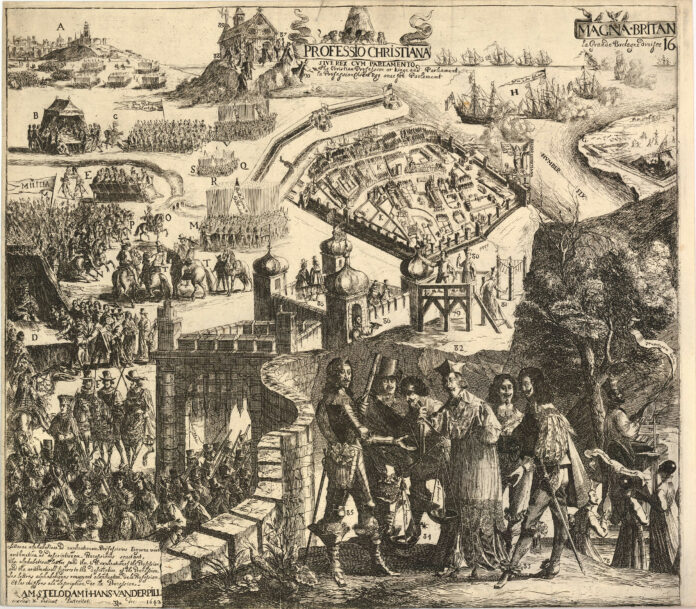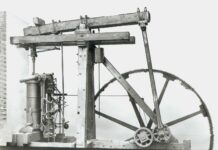
Socialistisk Biblioteks Tidslinje med links til begivenheder og personer i 1640.
Se også Index over personer, organisationer/partier og værker (som bøger, malerier, mm.), steder, begivenheder, mv., der er omtalt på hele Tidslinjen, titler og indhold på emnelisterne osv.
3. november 1640
Det engelske parlament samles – og bliver den ene side i kampen mod kongemagten og adelen i den engelske revolution, (for borgerlige historikere: kun den engelske borgerkrig).
Leksikale artikler mv.:
- Engelske revolution. Af Kåre D. Tønnesson (Leksikon.org)
- Den Engelske Borgerkrig (Denstoredanske)
- English Civil War (Wikipedia.org)
- Long parliament (Wikipedia.org)
- The English Revolution (Marxists Internet Archive)
Artikler / Articles:
Den Engelske borgerkrig 1640-49. Af Charlie Lywood (Socialistisk Arbejderavis, nr. 385, 15. marts 2021, s.6) (Almindelige menneskers historie, del 15). “… banede vejen for frigørelsen af markedskræfterne, som den feudale system havde holdt tilbage.”
Den engelske revolution og borgerkrig. Af Adam Ring (Revolution, 24. september 2013). “Den engelske revolution var en borgerlig revolution i marxistisk forstand …”
The causes of the English Revolution + 1640-1645: revolution and war in England. Part 40 + 41 in Neil Faulkner: A Marxist History of the World (Counterfire, 22 June + 2 July 2011)
The London Revolution 1640-1643: Class Struggles in 17th Century England. By Dominic Alexander (Counterfire, October 27, 2022). Review of Michael Sturza’s book, The Mad Duck Coalition (2022, 226 p.). “Sturza’s The London Revolution demonstrates the power and coherence of Marxist approaches to the seventeenth century.”
The Levellers, the labouring classes, and the poor (Counterfire, May 31, 2020). “In an essay soon appearing in the Bunyan Studies journal, John Rees looks at the Leveller programme in relation to the social structure of 17th century England.”
A common treasury for all: Gerrard Winstanley’s vision of utopia. By Martin Empson (International Socialism, Issue 154, Spring 2017, p.129-142). “Winstanley was the ideological driving force behind the Diggers, or as they preferred to be known, the True Levellers, a radical left-wing movement within the English Revolution.”
The Leveller Revolution: Radical Political Organisation in England 1640-1650. By Dominic Alexander (Counterfire, November 24, 2016). Review of John Rees’ book (Verso, 2016, 490 p.): “[The book] makes a powerful case that Leveller organisation during the English Revolution was essential to its success.” See also review by Richard Bradbury: Uncovering the history of the English Revolution (International Socialism, Issue 155, Summer 2017) + Daniel Johnson: Remembering the English Revolution (New Politics, Issue 66, Winter 2019).
John Lilburne: free-born 400 years ago … and still the man of the hour. By John Rees (Counterfire, February 3, 2015). “The Leveller leader should be remembered for many reasons, not least his commitment to building revolutionary organisation.”
The Leveller family chronicles. By John Rees (Counterfire, 18 May 2014). “New work on the Levellers and other radicals of the seventeenth century underlines the crucial role they played in the English Revolution.”
The Levellers and the 1640s English Revolution. By Graham Milner (Links, October 2009). “We have picked out a rough outline of the salient points in the struggle between king and parliament from 1640 to 1645 …”
The last stand of the Levellers. By Dudley Edwards (In Defence of Marxism, 27 October 2009). “This article was written in 1947-48 to commemorate the three-hundredth anniversary of the mutiny in 1649 of regiments of Cromwell’s army …”
Features: Oliver Cromwell’s legacy. By John Rees (Socialist Worker, Issue 2117, 6 September 2008). “Cromwell was the decisive figure of the English Revolution of the 1640s.”
The English Civil War. By Bill Jefferies (Permanent Revolution, September 2008). “The English revolution was the first of the great bourgeois revolutions. It shattered feudalism and made the way for the English capitalists to dominate the world.”
Cromwell: ‘The lion of the 17th century’, by Gareth Jenkins +
‘A common treasury for all’, by Duncan Brown – about some of Cromwell’s left wing opponents (Socialist Review, Issue 229, April 1999). “Oliver Cromwell was the architect of England’s revolution who understood that if society was to develop, the old order had to be overthrown.”
Brian Manning and the dialectics of revolt. By James Holstun (International Socialism, Issue 103, Summer 2004). “Manning’s work puts English workers at the very centre of the English Revolution …”
+ Obituary: A true Leveller (Socialist Review, June 2004). “Alex Callinicos pays tribute to the life and work of Brian Manning.”
The Putney debates: visions of democracy. By Andrew Stone (Socialist Worker, Issue 2076, 10 November 2007). “In the midst of the English Revolution some 360 years ago, radical anti-royalists outlined their plans for a new egalitarian society.”
Revisionism revised. By Brian Manning (International Socialism, Issue 82, Spring 1999). Review of Norah Carlin, The Causes of the English Civil War (Basil Blackwell, 1999, 200 p.). “Norah Carlin’s new book is designed as an introduction for students.”
Dreams of equality: the levelling poor of the English Revolution. By Judy Cox (International Socialism, Issue 83, Summer 1999). Review of Brian Manning, The Far Left in the English Revolution 1640 to 1660 (Bookmarks, 1999)
The good old cause – an interview with Christopher Hill, by Lee Humber & John Rees (International Socialism, Issue 56, Autumn 1992). About the development of the debate around the English Revolution over recent years.
The First English Revolution. By Norah Carlin (Socialist Workers Party, April 1983, 44 p.). 18 chapters + Further reading.
Marxism and the English Civil War. By Norah Carlin (International Socialism, Issue 10, Autumn 1980, p.106–128). “A serious re-examination of the role of the gentry by Marxists could disarm the ‘New History’ completely and refocus our attention where it rightly belongs: on the bourgeoisie and the exploited classes.”
Tercentenary of English Revolution: 1649-1949. Part 1: Cromwell and the Levellers. By C.L.R. James (Fourth International, Vol.10, No.5, May 1949) + Part 2: Ancestors of the proletariat (No.8, September 1949). “For nearly three centuries the truth about the Levelers remained on the whole in obscurity.”
The English Civil Wars. Chapter 1, -i: Albert Weisbord: The Conquest of Power (New York, Covici-Friede, 1937). “The English Civil Wars, although caused by the King’s heavy taxation of the bourgeoisie without their consent, were fought with religious texts, as though religious and not economic questions were the basic issues …”
Klassiske bøger / classics:
The English Revolution 1640 (1940). By Christopher Hill (Marxists Internet Archive) + Obituary by Brian Manning: Turning point in history (Socialist Review, March 2003)
Cromwell and communism: Socialism and democracy
in the Great English Revolution (1895). By Eduard Bernstein (Marxists Internet Archive)
Se også på Socialistisk Bibliotek/ See also at Socialist Library:
Tidslinjen: 3. september 1658, om Oliver Cromwell.


































